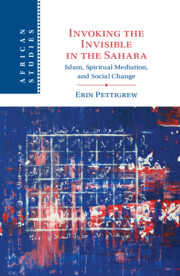Book contents
- Invoking the Invisible in the Sahara
- African Studies Series
- Invoking the Invisible in the Sahara
- Copyright page
- Epigraph
- Dedication
- Contents
- Illustrations
- Acknowledgments
- Notes on Orthography and Translation
- Abbreviations
- Introduction
- Part I Knowledge and Authority in Precolonial Contexts
- 1 Principles of Provenance
- 2 Local Wisdom
- Part II Rupture, Consonance, and Innovation in Colonial and Postcolonial Mauritania
- Part III Articulating Race, Gender, and Social Difference through the Esoteric Sciences
- Glossary
- Bibliography
- Index
- African Studies Series
2 - Local Wisdom
Contestations over l’ḥjāb in the Eighteenth–Nineteenth Centuries
from Part I - Knowledge and Authority in Precolonial Contexts
Published online by Cambridge University Press: 19 January 2023
- Invoking the Invisible in the Sahara
- African Studies Series
- Invoking the Invisible in the Sahara
- Copyright page
- Epigraph
- Dedication
- Contents
- Illustrations
- Acknowledgments
- Notes on Orthography and Translation
- Abbreviations
- Introduction
- Part I Knowledge and Authority in Precolonial Contexts
- 1 Principles of Provenance
- 2 Local Wisdom
- Part II Rupture, Consonance, and Innovation in Colonial and Postcolonial Mauritania
- Part III Articulating Race, Gender, and Social Difference through the Esoteric Sciences
- Glossary
- Bibliography
- Index
- African Studies Series
Summary
Chapter 2 uses a colloquial expression from contemporary Mauritania – “al-ḥikma kuntiyya aw fūtiyya” – to examine Mauritanian narratives that place the consolidation and localization of the Islamic esoteric sciences in the Sahara in the eighteenth century. The expression shows how Mauritanians today associate these sciences with the powerful scholarly and commercial network of the Kunta, a confederation known for its Islamic learning, and the Fulbe torodbe scholars who established theocratic states in West Africa. Both communities continue to associate these sciences as solely embedded in networks linked genealogically to Arab identity. This colloquial expression shows how Mauritanians today conceive of this esoteric religious wisdom as deployed at the very local level, spread through two regionally important religious communities, yet simultaneously connected to the longer history of Islam in the Muslim world, and circulating at the global level of Sufi networks. By the end of the nineteenth century, differences in interpretation and practice of the Islamic esoteric sciences had amplified: questions regarding which esoteric and medical techniques were permitted within Islam and which were not were intensely debated, as scholars from the Saharan West elaborated their own intellectual positions and political objectives in the ways they classified these sciences.
- Type
- Chapter
- Information
- Invoking the Invisible in the SaharaIslam, Spiritual Mediation, and Social Change, pp. 74 - 106Publisher: Cambridge University PressPrint publication year: 2023

